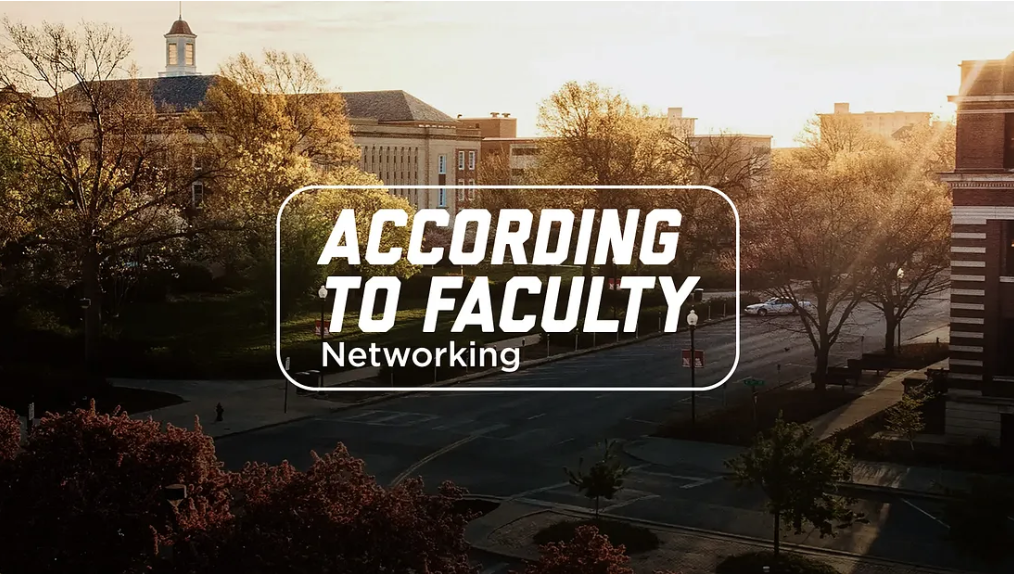
Do you shudder at the thought of “networking”? We get it. That’s why we asked four faculty members: Dr. Gwendolyn Combs, Dr. Ronald Faller, Jemalyn Griffin, and Dr. Robert Twomey, to share their thoughts and expertise on networking for Husker students.
Read on for their illuminating tips, tricks and ideas on the art of networking and how building your network can pay off in ways you might never imagine!
What does “networking” mean to you?
Dr. Gwendolyn Combs
Associate Professor, Management | College of Business
For me networking refers to extending oneself to others for several reasons that can include meeting and engaging with others, getting to know people on a personal level because of mutual interest or their delightful personality, or expressing a sincere interest, support and appreciation for the contributions to their work or social justice and humanitarian efforts.
Dr. Ronald Faller
Director, Midwest Roadside Safety Facility
Research Professor, Civil and Environmental Engineering
College of Engineering
Although networking is often thought to largely pertain to the business and professional communities, it also naturally occurs with increased involvement in service-based organizations and associations.
Jemalyn Griffin
Assistant Professor of Practice, Advertising
College of Journalism and Mass Communications
Networking is an opportunity for you to connect with someone with a common interest. Networking can happen anywhere — from national conferences to the classroom to running errands on a weekend.
Dr. Robert Twomey
Assistant Professor, Emerging Media Arts
Johnny Carson School of Theatre & Film
Networking sounds like a loaded term (or would have, to a younger me): some intentional, business-like strategy to make connections and get ahead. But, in reality, networking simply means meeting people who share your interests and enthusiasms and keeping in touch with these people over time.
Why is it important for students to think about networking in their own lives?
GC: It’s a golden opportunity to obtain trusted advice on important career decisions and learn from others’ experiences. Networking can allow a natural match for a mentor/sponsor and protege/mentee relationship that can be instrumental for career success.
RF: Professional networking has the potential to positively influence one’s life and career by opening doors and creating opportunities that may not have been available if not for the introductions that were made and relationships that were developed.
JG: I always encourage students to reach out to professionals they are curious about — whether they want to work at a dream company, learn more about an industry or simply connect with someone who they find interesting. The world is small — especially with technology like LinkedIn — so students should utilize the tools they have access to grow their knowledge and network.
RT: I think it is important to realize that the people you meet — whether at school, in internships or jobs, in the community — are valuable members of your network. Sometimes the value of this network only becomes apparent later in time.
How has networking helped you in your professional career?
GC: During my careers (yes, we can have multiple career branches, so to speak), I have been fortunate to enjoy support and mentorship experiences through both my professional and personal networks. My network relationships have made me aware of work opportunities and let hiring officials know about my knowledge, skills and abilities.
RF: I have personally experienced rewarding research and business opportunities that have come to fruition many years after making networking connections within service-based, professional organizations. Start the networking process with an investment of your time and participation in activities without an expectation of personal benefit in the immediate future.
JG: Networking has played a significant role in my career trajectory. Through my involvement within my communities and national organizations like Public Relations Society of America and American Marketing Association, many opportunities have come my way. Being connected also affords me the ability to connect my students and other like-minded individuals. It is a great feeling to be part of a global community.
RT: Some of my most exciting experiences have come from cold calling or sending an email out of the blue. I always encourage students to reach out to people they admire, even famous people, if they like the work they are doing.
What is a trick, habit or practice that has helped you network in your professional career?
GC: Do not be afraid of “arranged” introductions to major contributors in your field. It is ok to ask someone whom you trust to introduce you to someone that you want to get to know. Also, plan for those encounters (what is your purpose, do some research on the person and what interests you about them, be professional and gauge their and your level of interaction.
RF: I am known to tell students to treat each workday and networking opportunity with the assumption that one is always “on the interview”. One does not know how often and in what circumstances that they are being evaluated, or by whom.
JG: Whenever you meet someone at a networking event or conference, one way to remember their name is to say their name to them three times during a conversation. I usually have my students practice this so you can remember their face and put it to a name. Additionally, it is helpful to write a few notes on a business card or program after you meet someone and make note of something you shared.
RT: I would encourage people to remain open to the folks they meet, and to try to stay in touch! Celebrate your friends’ accomplishments, stay in conversation with them as you go along in your career.
To view the full article access this link: https://medium.com/university-of-nebraska-lincoln/how-to-network-according-to-faculty-2eab480606b2
More details at: https://medium.com/university-of-nebraska-lincoln/how-to-network-according-to-faculty-2eab480606b2